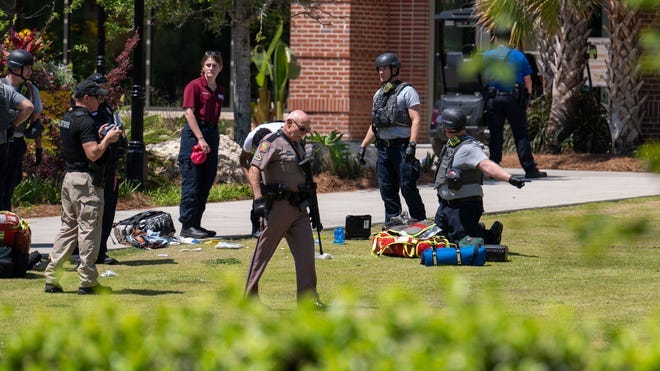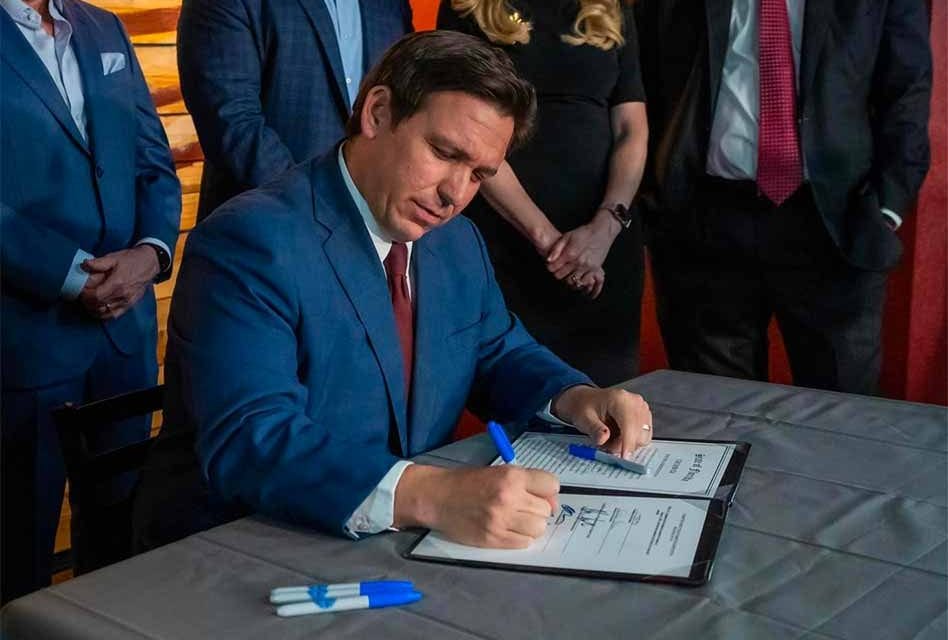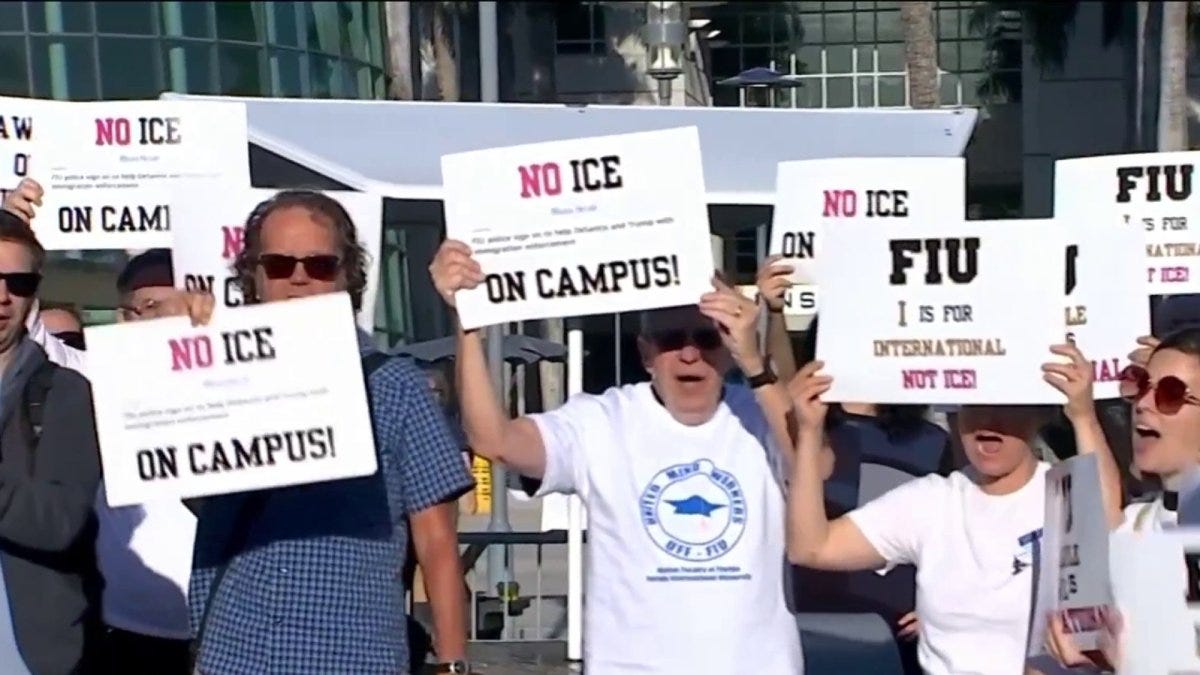Florida Senate Blocks Bill Lowering Firearm Purchasing Age & FSU Shooting Sparks Push for Stricter Gun Laws
April 24, 2025 - This Week's News from Central Florida
Welcome to this week’s edition of the Central Florida Times, an independent, reader-supported newsletter focusing on the Sunshine State. These are the most important stories you need to know from across Central Florida. To never miss an update, subscribe here:
Here’s the latest from Central Florida…
Florida Senate Blocks Bill Lowering Firearm Purchasing Age Amid FSU Shooting Fallout
The Florida Senate Rules Committee has declined to hear a House-approved bill (HB 759) that would lower the minimum age to purchase rifles and other long guns from 21 to 18, marking the third consecutive year such measures have stalled in the upper chamber. The decision comes days after a mass shooting at Florida State University left two dead and six injured, though Senate Rules Chair Kathleen Passidomo (R-Naples) stated the bill’s exclusion from the agenda was decided before Thursday’s incident. The Rules Committee is key in determining what bills reach the Senate floor before the session ends on May 2. Passidomo, a former Senate president, reaffirmed her commitment to maintaining the state’s post-Parkland gun laws, which raised the long-gun purchase age to 21 in 2018. The House passed HB 759 in March with a 78-34 vote, but Senate counterparts remain unaddressed in committees. Senate President Ben Albritton (R-Wauchula) has not publicly endorsed the repeal. The 2018 law survived a legal challenge by the National Rifle Association (NRA) when the 11th Circuit Court upheld it in March, though Florida Attorney General James Uthmeier has declined to defend it in potential Supreme Court appeals. Advocates argue lowering the age risks repeating tragedies, citing data showing 18-20-year-olds are three times likelier to commit gun homicides than older adults. While the 20-year-old perpetrator of the FSU shooting used a handgun owned by his mother, the timing has intensified scrutiny of firearm access.
Florida Democrats, College Students Push Stricter Gun Laws After FSU Shooting
In the wake of the tragic shooting at Florida State University on April 17 that claimed two lives and injured several others, Democratic leaders in the Florida House are calling for stronger gun regulations. Frustration is mounting, including among college students, as debate over the state’s gun laws has reignited, especially as the Legislature advances measures that would loosen restrictions put in place after the 2018 Parkland school shooting. This includes the Florida House’s recent passage of a bill to lower the minimum age for purchasing long guns from 21 to 18. The 20-year-old shooter at FSU was armed with both a handgun and a shotgun—despite current state law prohibiting such purchases by anyone under 21. Meanwhile, the Senate is moving forward with a proposal for a four-month sales tax holiday on firearms and ammunition. Student activists have testified against the tax breaks and age rollback, arguing that lawmakers are ignoring the voices of those most affected by gun violence. Despite repeated appeals, Democratic-sponsored gun control bills—such as safe storage mandates and expanded background checks—have not received committee hearings. “We can honor the Second Amendment while also doing what we can to prevent these needless, awful acts of violence,” said Rep. Christine Hunschofsky (D-Parkland), who served as mayor of Parkland during the 2018 shooting at Marjory Stoneman Douglas High School. Earlier in the legislative session, she introduced a bill requiring universal background checks and banning the sale of untraceable firearms, but the measure has not moved since its introduction. “This is the time to ensure we have the resources and safeguards in place to stop these tragedies,” she added. Democrats argue the state’s GOP leadership continues to sideline “common sense” gun reforms as they push for safe storage laws, expanded background checks, and scrutinize existing firearm access.
Florida Governor Signs Four Bills into Law; Others Await Action
Governor Ron DeSantis has recently signed four bills into law, adding to a growing list of legislation enacted within the last two weeks. Among them are measures addressing court orders, pet insurance, environmental resiliency grants, and first responder support:
HB 513 (Electronic Court Orders): Requires clerks to electronically transmit involuntary examination orders, risk protection petitions, and related documents to sheriffs within six hours. Effective July 1.
HB 655 (Pet Insurance): Regulates pet insurance under “property insurance,” mandating disclosures on exclusions (e.g., preexisting conditions) and claim details. Effective January 1, 2026.
HB 1313 (Trust Funds): Re-establishes the Resilient Florida Trust Fund for environmental grants. Effective July 1.
SB 421 (First Responder Support): Expands peer support access to law enforcement support staff, ensuring confidentiality protections. Effective July 1.
Pending Legislation
Another eight bills have been passed by the Florida Legislature and are currently awaiting DeSantis’ signature, including:
HB 479: Authorizes a court to order restitution to a property owner from drivers fleeing crash scenes involving property damage.
HB 597: Allows schools to obtain glucagon prescriptions for diabetic students.
HB 615: Permits electronic tenant-landlord notices with mutual consent.
HB 791: Authorizes monitored “infant safety devices” at hospitals and fire stations to accept surrendered infants.
HB 1195 (“Gage’s Law”): Requires fentanyl testing in hospital drug screenings.
Earlier last week, the governor signed the first bills of the 2025 regular session into law, officially recognizing the “Gulf of America” in state statutes and educational materials. DeSantis has approved 10 bills from the session that have become law.
Lawmakers Advance Tougher Rules on Citizen Ballot Initiatives
Florida legislators are considering major changes that could significantly restrict the citizen initiative process used to amend the state constitution. Prompted by last year’s high-profile campaigns to legalize marijuana and expand abortion rights, lawmakers are debating whether to impose tighter rules on how amendments make it to the ballot via petition gathering. A Senate proposal includes a ban on public money being used to advocate for or against amendments. The House version stops short of that, but still introduces major changes. Among them: requiring voters to submit partial Social Security or driver’s license numbers on petitions, cutting the time to submit signatures from 30 to 10 days, and alerting voters they can retract their support. The bills also introduce steep fines for errors or fraud in the petition process, and allow any voter to challenge petition certifications in court. The House version also establishes a $1 million bond requirement on initiative sponsors to enforce accountability and compliance with election laws, a provision that is omitted from the Senate’s bill. Supporters of the measures say they are necessary to guard against fraud and out-of-state influence, pointing to recent fines against groups behind past initiatives as evidence of abuse. But Democrats argue the legislation would stifle grassroots democracy, making citizen-led changes to the state constitution exceptionally difficult. The House passed its version along party lines. The Senate bill is now up for debate on the floor, where it is expected to pass. There are more than a dozen potential ballot initiatives proposed for the 2026 election.
University Faculty Raise Concerns Over Visa Revocations, Urge Ending ICE Cooperation
Faculty leaders across Florida’s public universities are sounding the alarm over increasing immigration-related disruptions affecting students and staff. In a letter to state officials, the Advisory Council of Faculty Senates demanded transparency for students and staff who were abruptly informed of visa cancellations by universities rather than federal authorities. The council, representing faculty from all 12 public universities, also passed a resolution calling on campus police to withdraw from 287(g) program cooperative agreements with U.S. Immigration and Customs Enforcement (ICE). “While these are distinct issues, both are happening at the same time,” said Florida Atlantic University’s faculty senate president William Trapani. “Both exist in relation to Trump’s war on immigrants and fever pitch to deport immigrants with or without cause.” The letter, addressed to State University System Chancellor Ray Rodrigues, highlights the lack of communication and guidance from state leaders. Faculty say ICE agreements risk eroding trust and jeopardizing student access to vital services. The Board of Governors has not responded publicly.
Report: $10 Million in Medicaid Funds Redirected to DeSantis-Linked Charity Was Owed to Taxpayers
Florida Gov. Ron DeSantis’ administration redirected $10 million in Medicaid funds owed to taxpayers to a charity overseen by First Lady Casey DeSantis, contradicting claims the payment was a separate donation, according to a draft settlement obtained by the Tampa Bay Times/Miami Herald. The $10 million was part of a $67 million settlement with Centene, Florida’s largest Medicaid contractor, which overbilled the state for prescription drugs. The funds were routed to the Hope Florida Foundation, which then allocated $5 million each to two nonprofits not required to disclose spending. These groups later funneled $8.5 million to a political committee tied to DeSantis’ former chief of staff, James Uthmeier, now attorney general, to oppose a 2024 marijuana legalization ballot measure. DeSantis has defended the $10 million as a separate charitable contribution by Centene, unrelated to what it owed back to the state via the settlement. However, the 2022 draft agreement shows that the exact $67 million figure matched the overbilling amount, indicating the $10 million was part of recovered Medicaid funds. Strict government rules on Medicaid spending require settlements to reimburse state and federal coffers. The House investigation into the diverted funds continues as GOP leaders suggest possible legal and ethical violations. DeSantis has sharply criticized the House inquiry as he asserts the arrangement was “100% appropriate.”
DeSantis Criticizes Florida House for Allegedly Defunding Police
Gov. Ron DeSantis sharply criticized Florida House Republicans last week, accusing them of undermining public safety by advancing a budget that eliminates 84 state trooper positions, cancels ballistic armor funding, and blocks planned raises for law enforcement. The governor chastised the budget proposal as a betrayal of both voters and law enforcement personnel, calling it a “donkey in an elephant suit” that jeopardizes Florida’s “law-and-order reputation.” The spending plan by the House would cut funding for raises, car dash cameras, vehicle replacements, ballistic armor, and eliminates 84 trooper positions and 73 dispatchers. The Florida House says those positions are being cut because they’re vacant. DeSantis accused GOP lawmakers of “stabbing the voters in the back” with a “terrible agenda,” arguing they are disloyal to conservative principles promised to the electorate. In Gov. DeSantis’ budget proposal rolled out earlier this year, he recommended $118 million in salary raises for over 4,700 state sworn law enforcement officers, including a 20% pay increase for entry-level sworn law enforcement officers and a 25% pay increase for veteran personnel.
Tourism Tax Reform Added to Florida Senate Tax Package
A proposed overhaul of how tourism tax dollars can be spent has been included in the Florida Senate’s broader tax legislation. The measure would cap annual tourist development tax (TDT) spending on advertising and marketing at $50 million per county while freeing up funds for infrastructure and housing. Sen. Carlos Guillermo-Smith (D-Orlando) introduced the bill, which cleared the Senate Finance and Tax Committee last week. “The inclusion of our TDT reforms in the Florida Senate tax package are a critical first step towards transformational change in how local government can use hotel taxes to fund community needs,” Guillermo-Smith said. Currently, funds from the tax, paid by visitors staying in hotels and short-term rentals, are restricted to promoting tourism or funding related projects. Under the proposal, counties must spend at least 40% of TDT revenue on tourism promotion up to the $50 million cap before using excess funds for public projects. The legislation targets counties like Orange, which collected $360 million in TDT revenue last fiscal year, with $99 million allocated to Visit Orlando—more than the $80 million budget of Visit Florida, the state’s official tourism marketing organization. In Pinellas County, $96.7 million was collected in TDT, with $36.8 million spent on targeted sales and marketing initiatives. Guillermo-Smith emphasized the need to redirect revenue toward roadway improvements, workforce housing, and public transit, such as funding expansion to the SunRail. The bill would not apply to counties that collect less than $50 million annually in TDT.
Thousands Protest Trump Policies Across Florida
During last weekend’s “National Day of Action,” thousands gathered across Florida in protest of the Trump administration’s policies, with nearly 2,000 demonstrators in Naples and Fort Myers alone. Organized under banners like “Say No To Tyranny” and “Due Process For All,” the protests spanned from Southwest Florida to Tampa and Jacksonville, citing concerns about the economy, immigration, and spending cuts to federal programs led by billionaire Elon Musk’s DOGE efforts. Protesters voiced deep worries over the future of democracy and human rights, with demonstrations in Tampa focusing on the two Venezuelan asylum seekers who were alleged to be wrongfully deported to a maximum security prison in El Salvador. The men lived in Tampa before being detained by ICE on March 15 and were among 200 others deported to El Salvador for alleged gang affiliations or terrorism-related ties. The demonstrations witnessed across Florida were part of a nationwide protest organized by the 50501 Movement, a grassroots effort resisting what it views as executive overreach by the Trump administration.
Lawmakers Weigh Tax Cuts on Aviation Fuel, Gold & Charitable Trusts
Florida’s House Ways and Means Committee has unveiled a sweeping tax proposal that could reduce state revenues but spark new business opportunities across key sectors. The new proposal includes eliminating aviation fuel taxes, cutting cardroom levies, and removing sales taxes on gold, silver, and platinum bullion regardless of transaction size. The first measure would eliminate the state’s aviation fuel tax, costing the general fund $1.8 million in the first year and over $25 million in recurring trust fund revenues. Committee chair Rep. Wyman Duggan (R-Jacksonville) said the move aims to make Florida more attractive to airlines that currently avoid refueling in the state due to costs. The proposal would also eliminate the sales tax on gold bars and other bullion, which lawmakers say would simplify the tax code and align with how other states treat precious metals as legal tender. Currently, sales tax is exempt on transactions of precious metals exceeding $500. Its impact on state revenues would be about $1.6 million per year. Additionally, the plan reduces cardroom operator taxes from 10% to 8%, trimming $2.3 million yearly, and redirects $5 million in incentives from the Florida Thoroughbred Breeders’ Association to racetracks. Charitable trusts would also gain a corporate income tax exemption, reducing collections by $1.1 million annually. The cuts aim to prioritize boosting economic activity over short-term revenue losses.
Florida Prepares New Plans to Restore Polluted Springs
Florida’s Department of Environmental Protection (FDEP) is finalizing updated plans to improve the health of the state’s freshwater springs. Known as Basin Management Action Plans, or BMAPs, the revised frameworks come in response to a court decision last year that found earlier versions did not meet state legal requirements. Specifically, the court ruled the original BMAPs failed to pinpoint pollution sources accurately. The new plans will assign pollution reduction targets to specific contributors such as municipalities, businesses, golf courses, and homeowners, depending on their share of contamination in each springshed. These targets will be enforceable by FDEP to ensure progress is achieved in reducing negative impacts on the health of watersheds. Of Florida’s 30 protected springs, 24 show excessive nutrient levels—including nitrogen and phosphorus—which degrade water quality. In Volusia County, for instance, septic systems are the main source of nitrogen, making up 74% of the pollution at Volusia Blue Spring. The plans submitted by FDEP also factor in expected population increases, which may further strain water quality. Drafts of the updated BMAPs are available online, and public comments will be accepted through May 2 via BMAPProgram@FloridaDEP.gov.
Florida Citrus Grower to Transform Groves into Massive Residential Development
Alico Inc., one of Florida’s largest citrus growers, is turning away from agriculture to focus on real estate. The Fort Myers-based company announced plans to build a 3,000-acre residential community near where Collier, Lee, and Hendry counties meet—just months after revealing it would exit citrus farming by the end of this season. The development will include two villages, each featuring around 4,500 homes, and will incorporate 6,000 acres of preserved conservation land, according to the company’s recent filing. Alico owns over 53,000 acres in Florida and nearly 49,000 acres of oil, gas, and mineral rights. The decision to pivot comes amid a steep drop in citrus yields due to disease and hurricanes, which have decimated the state’s once-thriving industry. As Florida’s population surges, more groves are being replaced with housing to meet the demand for new communities.
St. Petersburg Backs Away from Redeveloping Albert Whitted Airport
Albert Whitted Airport is poised to remain a key part of St. Petersburg’s waterfront for at least two more decades, as city leaders shift course on exploring alternative land uses. St. Petersburg Mayor Ken Welch, who once proposed exploring non-aviation options for the downtown site, has now endorsed accepting a state grant that would lock the property into airport use for 20 years. The grant, valued at $134,800, would be used for airport equipment and passed its first City Council hearing without objection. It will return for a final vote on May 1. Proposed redevelopment plans for the 119-acre Albert Whitted Airport included a park, housing, and an expanded innovation district. Welch cited changing conditions, including rising sea levels, disaster preparedness needs, and the city’s evolving transportation landscape as reasons for the pivot. The airport also holds importance during hurricanes, when it can serve as a vital supply hub if bridges are impassable. A task force is also studying new aviation technologies and air mobility options such as eVTOL aircraft, positioning the airport for a high-tech future.
Thanks for reading this edition of the Central Florida Times. To never miss an update, subscribe for free:
In the meantime, if you learned something or found this read interesting, please consider sharing it to grow our community!











